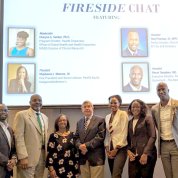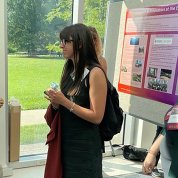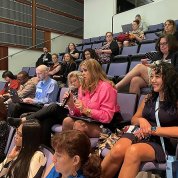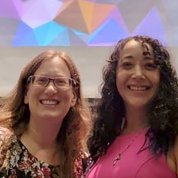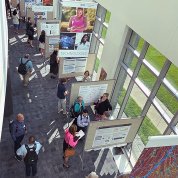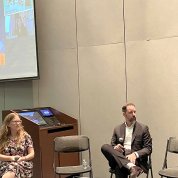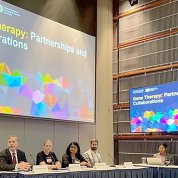Forum Focuses on Gene Therapy, Patient Engagement
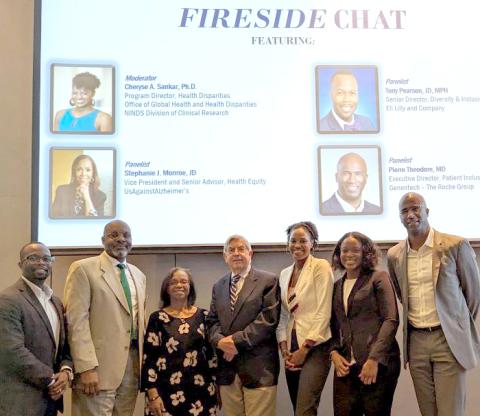
Photo: Tam Vo/NINDS
Representatives from more than 100 nonprofit organizations across the country recently joined NINDS at its 17th nonprofit forum, “Progress through Partnership.”
The day and a half hybrid meeting held at the Natcher Center gave patient advocacy groups an opportunity to share common interests, engage directly with NIH program staff and learn about the National Institute of Neurological Disorders and Stroke (NINDS), NIH and other federal programs.
“The nonprofit forum is a highlight for NINDS every year,” said NINDS Director Dr. Walter Koroshetz. “This is the key meeting in which we get to hear from so many different groups and also a chance for the different groups to talk to each other and share lessons learned. We always start out acknowledging the lack of effective therapies for many of the diseases but our institute and the people who work here and the nonprofits are all dedicated to try and change that. We are all involved in the same ecosystem but in different ways, and the goal that binds us all together is to find better treatments for neurological diseases.”
Organized in 2005, the forum provides a way for organizations to share experiences and information with each other, and for NINDS to understand how to work with patient advocacy groups effectively to address research needs and challenges.
This year’s event welcomed its largest crowd to date with more than 340 participants, including persons with lived experience and caregivers from nonprofit groups, NINDS staff and representatives from industry and other federal agencies.
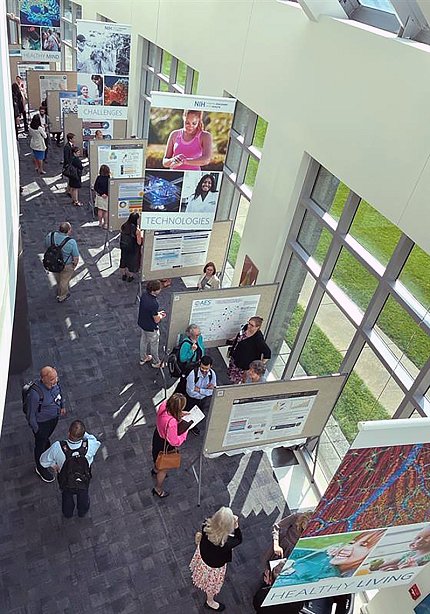
Photo: REBEKAH CORLEW/NINDS
Rare disease crusader Terry Pirovolakis began with a keynote presentation, “Bespoke Gene Therapy.” He introduced the overall theme—gene therapy—and shared his experiences in trying to help his son, Michael, who has spastic paraplegia type 50—a rare, slowly progressing neurodegenerative disorder.
The forum also included panel discussions, one-on-one meetings with NINDS program staff—in person and via Zoom—a poster session and networking opportunities.
In “Gene Therapy: Partnerships and Collaborations,” panelists discussed the important role of patients and their advocates.
“In an ideal situation we would love to find cures, but that may not always be possible,” said panelist Dr. Gopa Raychaudhuri of the Food and Drug Administration (FDA). “There could be therapies that provide significant benefit and what’s important is to hear the patient voice in that, right from the very beginning. Patient engagement is critically important and it’s critically important from day one as product development plans are being formulated.”
During “Ethics in Cell Therapies and Dilemmas Researchers Face,” moderated by NINDS Program Director Dr. Jill Morris, panelists from a variety of backgrounds including researchers and patient advocates, shared timely information about the ethics and challenges in gene therapy.
Dr. Penny Dacks of the Association for Frontotemporal Degeneration led the “Nonprofits Funding Non-Profit Research” session that focused on strategies and resources organizations employ to “move the needle.”
“We [nonprofits] have to remember…that we are a very small piece of a large ecosystem for advancing treatments and diagnostics for our conditions,” Dacks said.
“Success Stores: Newly Approved Drugs—The Stages of Approval,” a forum favorite, showcased drugs for Rett syndrome, Friedreich’s Ataxia and amyotrophic lateral sclerosis or ALS. In addition to the excitement and hope that these drugs bring to the community, the presenters also shared the stages each drug passed through on its journey to approval.
On day two, NINDS Acting Deputy Director Dr. Amy Adams highlighted cross-cutting strategies to increase patient engagement and outlined steps NINDS is taking to partner with people with lived experience.
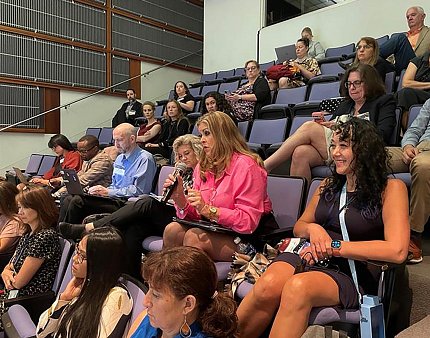
Photo: REBEKAH CORLEW/NINDS
“I want to emphasize that not only does this feel like the right thing to do, it makes the research better, it makes it move faster,” said Adams. “All of a sudden we have treatments for these rare and ultra-rare conditions and that really is the result of the research community partnerships that were developed among the researchers themselves with industry and with government—NIH, FDA and others—and with the nonprofit organizations.”
A special session, “Community Engagement Strategies to Boost Diversity Enrollment in Clinical Trials from a Pharma Industry Perspective,” moderated by NINDS Program Director Dr. Cheryse Sankar, featured a fireside chat with speakers from pharmaceutical companies discussing their efforts using community engagement to diversify clinical trial participation.
“Big pharma doesn’t always have the best reputation and I want to stress the notion that going forward one of our ways of becoming better stewards and better participants in clinical development is to make sure that the voices of the patients are heard in the entire drug development process,” said panelist Dr. Pierre Theodore, executive director of Health Equity and Patient Impact at Roche Genentech. “The door is open. We want to hear from you, we want to connect, we want to partner as we continue to try to address health disparities that requires us to be a little bit more nimble in what partnerships look like.”
Recordings are available at: go.nih.gov/qeUlXyG and https://go.nih.gov/isfa9Vc.
For more information on the forum, visit https://go.nih.gov/nu0wUb4.

